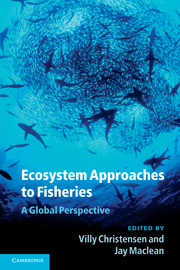Book contents
- Frontmatter
- Contents
- List of contributors
- Foreword
- Preface
- Acknowledgments
- 1 Introduction: toward ecosystem-based management of fisheries
- I Life in the oceans
- II Evaluating impact on marine life
- III Managing living resources
- IV The human side
- V Impacting policy
- 17 Linking conservation policy and science
- 18 Using the science
- 19 The scientist as communicator
- 20 Scenario development for decision making
- 21 The relationship between science and ocean policy
- Index
- References
18 - Using the science
Published online by Cambridge University Press: 05 June 2012
- Frontmatter
- Contents
- List of contributors
- Foreword
- Preface
- Acknowledgments
- 1 Introduction: toward ecosystem-based management of fisheries
- I Life in the oceans
- II Evaluating impact on marine life
- III Managing living resources
- IV The human side
- V Impacting policy
- 17 Linking conservation policy and science
- 18 Using the science
- 19 The scientist as communicator
- 20 Scenario development for decision making
- 21 The relationship between science and ocean policy
- Index
- References
Summary
This chapter outlines my perspective on the scientist not at as a communicator or advocate but as an academic, and how the products of the academic scientist are used in conservation advocacy and by organizations like ours.
I was trained as a true academic. In those days, the rule was that you were not allowed to work on anything in your own backyard – it had to be very far away from where you work if you are going to study it – and it couldn't be of any use to humanity. We were all guilty of the shifting baseline syndrome (Pauly, 1995; Jackson and Jacquet, this volume); wherever we went, we considered the area pristine, or close to it, especially if it was in the tropics. So the academic stereotype is an individual who is not really connected to the real world – in fact, someone who could not be further from the real world. We are blessed in our current state of ocean conservation advocacy that there are scientists, indeed real academic scientists, with respected careers at universities, who are willing to put their work to use.
By conservation advocacy, I mean the work of organizations interested in change, such as Oceana and the Natural Resources Defense Council. These organizations are interested in social change, whether by changing behaviors of fishers or polluters.
Information
- Type
- Chapter
- Information
- Ecosystem Approaches to FisheriesA Global Perspective, pp. 290 - 294Publisher: Cambridge University PressPrint publication year: 2011
